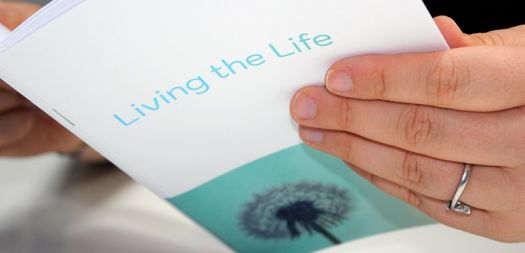Design project creates more compassionate support materials for people with dementia
14 October 2020
MinD sought to deliver designs for self-empowerment and social engagement
Researchers exploring how to deliver more sympathetic and uplifting support for people living with dementia have produced a board game, a mindfulness booklet and a set of co-design guidelines they hope will spark a new generation of considerate products and services.
The EU-funded research study, MinD - Designing for People with Dementia, examined how best to create new inspirational materials for people diagnosed with the degenerative brain disease in order to instill greater confidence and positivity in managing their everyday and social lives.
Existing literature, such as information pamphlets provided at the point of diagnosis, is largely pessimistic in tone and generic, people with dementia and carers participating in the study told researchers.
This left people with dementia and their families feeling anxious and unsupported, affecting their wellbeing, whereas what people felt they needed was an emphasis on activities a person can still do and what contribution they can continue to make to society.
Supporting people with dementia
Project lead Dr Kristina Niedderer, Professor of Design at Manchester Metropolitan University’s Manchester School of Art, said: “The main aim of the MinD project was to support people living with dementia, especially at the early stages, and to work with them to understand their needs, wants and wishes.
“They told us that existing support materials included information about a number of different diseases or the information was what we call ‘deficit-orientated’, meaning it focuses on the negative aspects.
“To address these shortcomings in support, which people with dementia and carers told us about, our designs specifically seek to provide support with managing life after the diagnosis.”
MinD, which was co-coordinated by the University of Wolverhampton, worked to co-design a suite of new products with the Public Participation Group of the Nottinghamshire Healthcare NHS Foundation Trust and the Alzheimer’s Society Research Partnership Programme in the UK, alongside international partners.
Professor Niedderer said the resulting board game, mindfulness booklet and design guidelines will enhance the quality of life, wellbeing, confidence, social contact and engagement for people living with dementia.

International collaboration
She said: “The MinD project has been an amazing international collaboration between researchers and professionals in design, architecture, ICT, psychology, and dementia care and policy.
“Only by bringing together such a diverse group of people, have we been able to develop designs that can make a difference for people with dementia.”
More than 50 people with dementia, family members and carers took part in the data collection phase, telling the researchers about their experiences, needs, wants and wishes, and at least another 50 were involved in the consultations and evaluations of the designs.
The Living the Life booklet offers reflective statements in five sections and some simple mindfulness exercises to help people relax and adjust to life after the diagnosis in a positive way that allows them to take charge of their own lives.
It is available in three languages - English, Spanish and German - and is already being used by individuals to support their loved ones with dementia.
Innovative storytelling board game
The This Is Me storytelling board game combines life story telling, reminiscence therapy and mindfulness to provide a safe and convivial atmosphere to allow people with dementia not just to revisit the past but to take motivation from it in order to approach the present and future with confidence.
Prof Niedderer said: “This is Me was evaluated with people with dementia in daycare groups in three countries - the UK, Germany and Spain - as well as with people in their homes in The Netherlands, with promising results.
“People with dementia who played the game in daycare groups with other people with dementia and caregivers felt that it was enjoyable, that it enabled them to share experiences and learn from it, that they enjoyed the social interaction which enabled them to get out of isolation, and that it enabled them to accept difficult issues, move on and think together with others about the future.”
Following the successful evaluation, the German hospital partner is using the This is Me concept already in its therapy groups, and the MinD team is looking to license the game to a manufacturer in order to make it more widely available.
Keeping social contact with others
One of the other ideas developed during the course of the project was Let’s Meet Up, an electronic system to maintain social contact and activities designed with and for people with dementia.
The initial prototype received very positive feedback and a fully functional final version will be developed and then evaluated.
More attention needed on design
Tom Dening, Professor of Dementia Research at the University of Nottingham and head of the Centre for Dementia at the university’s Institute of Mental Health, and also Honorary Consultant in Old Age Psychiatry at Nottinghamshire Healthcare NHS Foundation Trust, was one of the experts involved in the project.
He said: “Although there’s a lot of interest in technology and devices that may help people with dementia and their families, there has not been much attention paid to the design of such items.
“In particular, there hasn’t been much input from people living with a diagnosis of dementia. MinD set out to address these issues.
“What do people with dementia value? What do they think will help them live their lives as normally and independently as possible?
“The MinD team was uniquely placed to do this research, as it combined expertise in design, dementia and public involvement across several European countries.
“Applying principles of co-design in actual practice, MinD has shown how it is feasible to work with people with dementia and their carers to produce real-life products that will support their lives.
“Nottinghamshire Healthcare NHS Foundation Trust was proud to participate, bringing expertise in dementia, psychology, health technology and public involvement.”
International MinD Conference Dresden 2019 from Technisches Design on Vimeo.
MinD - Designing for People with Dementia was funded by the European Union’s Horizon 2020 research and innovation and staff exchange programme (RISE).
The MinD project has brought together 17 partners from eight countries. The full list of partners is:
• University of Wolverhampton in Wolverhampton, UK
• Manchester Metropolitan University in Manchester, UK
• Nottinghamshire Healthcare NHS Foundation Trust based in Nottingham, UK
• Etic Lab, a research and design consultancy in Powys, Wales, UK
• University of Twente in Enschede, The Netherlands
• Panton Design, a company in The Netherlands providing expertise in the design of products, services and processes for healthcare
• Zorggroep Sint Maarten, a care provider in The Netherlands
• Technische Universität Dresden in Dresden, Germany
• Alexianer St Hedwig Klinik Berlin in Berlin, Germany
• Alzheimer Europe, a continent-wide non-profit non-governmental organisation providing a voice to people with dementia and their carers
• University of Luxembourg in Luxembourg
• INTRAS, a Spanish non-for-profit organisation dedicated to high quality research and intervention in brain rehabilitation
• PichArchitects, an architectural practice based in Barcelona, Spain
• Universitat Politècnica de Catalunya in Barcelona, Spain
• DU IT (Design for User Innovation Technology), a research and development company in Florence, Italy, using innovative technology to design sensory systems and spaces for therapeutic purposes
• Queensland University of Technology in Queensland, Australia
• ITMO University in St Petersburg, Russia



